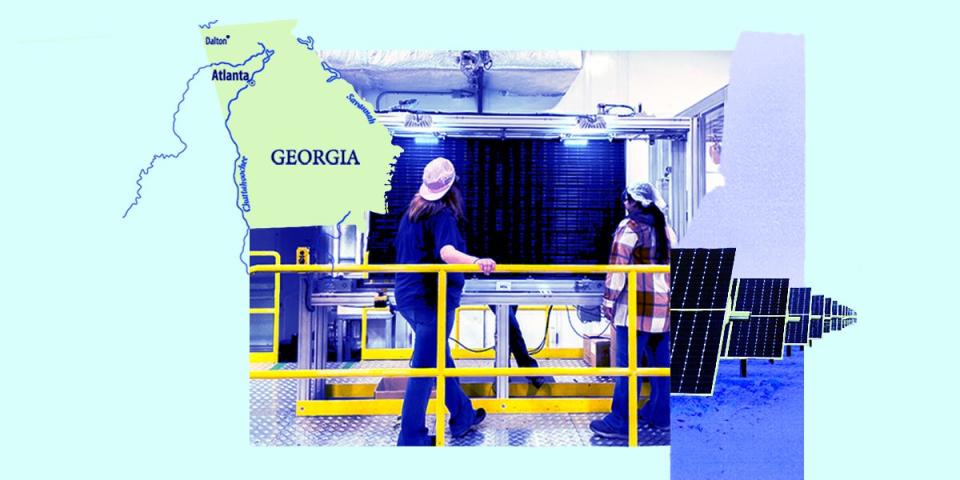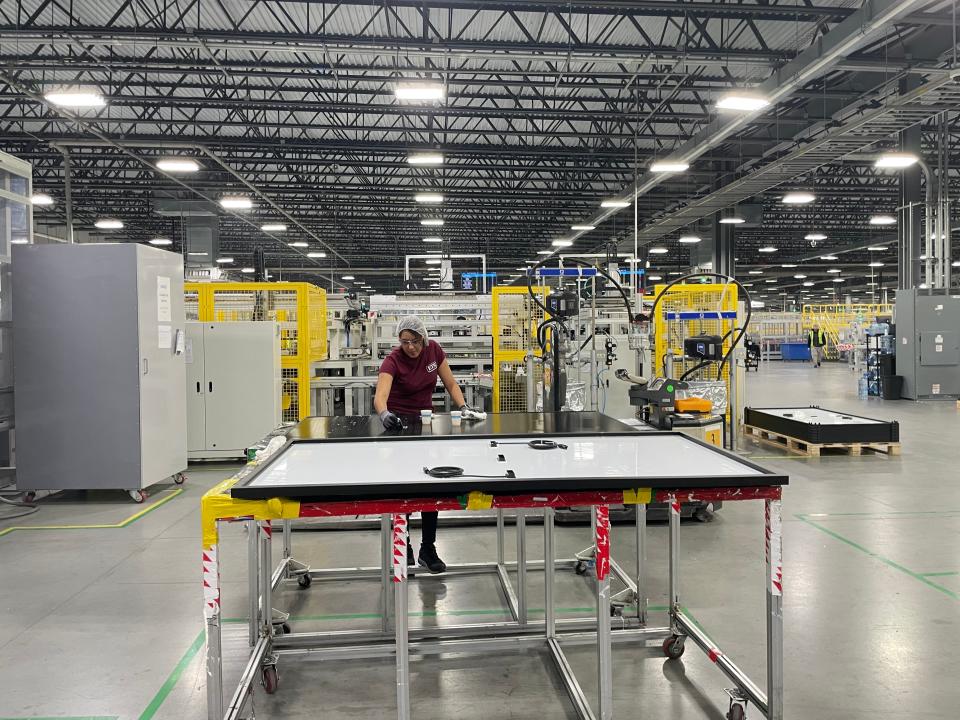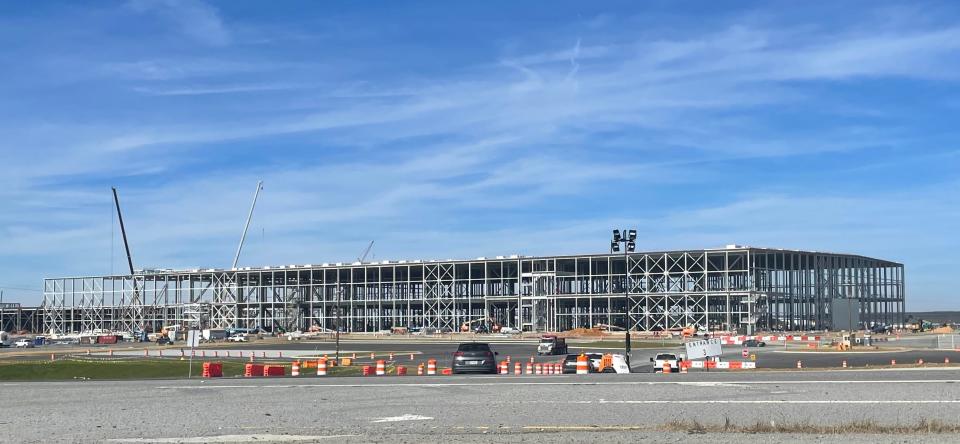How Georgia became America's green-manufacturing capital


When Robert Howey joined the US Navy right after high school, he didn't expect to return home anytime soon.
Howey, now 30, grew up in northwestern Georgia near Dalton, a small city known as the "carpet capital of the world." If he'd stayed in the area, he likely would have pursued a career in the carpet industry.
"That's one of the reasons why I wanted to leave," Howey told Business Insider.
Howey spent four years as an aerographer's mate analyzing the conditions above and below the ocean. But after being stationed in Japan during the Fukushima earthquake in 2016, he realized the military wasn't his long-term career.
He missed home and moved back to Dalton, where a job in carpet manufacturing was indeed the best-paying option. That was until 2018, when Howey heard about a new company moving into Dalton. A local staffing agency was recruiting for Qcells, a solar-panel manufacturing company owned by the South Korean conglomerate Hanwha Group.
"I didn't even know what a solar panel was," Howey, now a master training coordinator at Qcells, said. "In the beginning, it was just about getting a job where I could grow. Now I believe in the mission of completely clean energy."
Howey is among the 1,800 employees Qcells has hired since opening a solar assembly plant in 2019. The company finished an expansion in October, and it plans to open another factory in Cartersville, about an hour south of Dalton, to make smaller parts of solar panels, including ingots, wafers, and cells. Those parts are currently being imported from South Korea and Malaysia.

Qcells is part of a broader transformation of Georgia's economy into a renewable-energy manufacturing hub, accelerated by tax breaks in the Inflation Reduction Act that President Joe Biden signed in August 2022. Since then, more than $15 billion worth of investment has been announced in the state – the second-largest amount behind North Carolina, according to E2, a nonpartisan business group that advocates climate policy. Most of the money is for new battery plants to supply Georgia's growing electric-vehicle sector, while about $2.6 billion is set to go toward solar manufacturing, led by Qcells. E2 has estimated the projects could create 15,400 jobs statewide.
All the activity has made Georgia a key testing ground for the Biden administration's promise that tackling the climate crisis would create good-paying jobs and help reshore American manufacturing. Though companies have announced billions of dollars' worth of investments, efforts to build a domestic supply chain of solar panels and electric vehicles are still in their infancy and face stiff competition from China.
Aggressive recruitment
Experts in economic and workforce development say it's no accident this manufacturing is taking off in Georgia.
Bob Keefe, the executive director of E2, said southeastern states view economic development as "a blood sport." Attracting new companies is a priority for leaders in Georgia, North Carolina, and South Carolina, and the states typically offer generous tax breaks.
Keefe added that land and labor in the Southeast tend to be more affordable, in part because few workers are unionized. Many workers are also already skilled in manufacturing.
Beyond Qcells, the German auto-parts maker Gedia opened a factory in Dalton to supply the burgeoning EV industry in Georgia and the broader Southeast. In nearby Cartersville, two South Korean conglomerates, SK On and Hyundai, are building a battery plant to supply the electric vehicles Hyundai plans to assemble at a massive new complex in Savannah; both sites are expected to open in 2025. India's Rayzon Solar, which makes solar panels, chose Atlanta for its first US factory. SolarCycle, which reclaims old solar panels to make new ones, in February announced plans for a glass factory.

Pat Wilson, the commissioner of the Georgia Department of Economic Development, told BI that recruiting solar and electric-vehicle companies was strategic. Wilson said that on a trip to Germany his department organized with Gov. Brian Kemp shortly after he took office in 2019, executives they met with at Porsche and Mercedes-Benz talked at length about electric vehicles.
Qcells had already selected Dalton for its new solar-panel factory by the time Kemp was elected. Wilson said that was partly because of Georgia's decadeslong business relationship with South Korea, where the state established an office in 1985.
Wilson said he met with SK On's officials several times before it looked to open a battery factory in the Southeast. SK On opened two battery plants in Commerce, Georgia, in 2018 and hired some 3,000 workers, though it recently laid off more than 100 employees as automakers slowed EV investments, the Financial Times reported.
Beyond the ties to South Korean conglomerates, Georgia invests more than $100 million dollars a year in workforce training, budget documents show. A state-funded program known as Quick Start can be tailored to the technical skills companies are looking for and offered for free to workers. Georgia's network of 22 technical colleges also partners with local companies to prepare students for work.
Heidi Popham, the president of Georgia Northwestern Technical College, said the state agency that oversees that network of technical colleges developed an electric-vehicle-technician certificate, given the massive growth of that industry. She expects her college will offer that certification soon.
"The students in our automotive-technician program that work on the vehicles will have to have those skills," Popham told BI.
China looms large
Georgia's strategy in recruitment and workforce development is only part of the reason for the boom in renewable-energy-technology companies.
In 2018, President Donald Trump slapped tariffs on imports of solar panels and cells, with the goal of helping US manufacturers compete with cheaper imports from China and Southeast Asia. The tariffs were requested by two American companies, including Suniva, which had once been the fastest-growing solar company in the US before filing for bankruptcy protection in 2017.
Foreign companies shipping to the US, including Hanwha, were forced to reevaluate their supply chains.
"We have factories in Korea and Malaysia that were impacted by that duty," said Scott Moskowitz, the director of strategy and market intelligence at Qcells. "The US was our largest market, and we had long wanted to build a factory here. But that trade policy jump-started us making the investment."
Qcells' latest expansion plans were buoyed by the Inflation Reduction Act. The law authorized big tax credits for companies making renewable-energy technologies, including solar panels, batteries, and electric vehicles, in the US.
Those subsidies could increase if companies use what's known as domestic content: components of those technologies that are also sourced from the US. The Treasury Department is still working on final guidance for which components would qualify. An initial draft covers solar modules and cells but not wafers and polysilicon. In February, a dozen senators, including Sen. Jon Ossoff of Georgia, asked the Biden administration to include wafers and polysilicon to help reshore more of the solar-panel supply chain.
That change would benefit Qcells. Its parent company, Hanwha, invested in a polysilicon factory in Washington state, reviving operations after a nearly five-year hiatus.
Moskowitz said that though the law has spurred the most investment in US manufacturing in decades, these renewable supply chains still face headwinds, primarily from China. He added that China had compensated for its cratering real-estate sector by rapidly investing in export-oriented manufacturing inside and outside its borders.
According to BloombergNEF, China spent $676 billion on the green-energy transition in 2023, while the US spent $303 billion. The year prior, China spent $546 billion while the US spent $141 billion.
As a result, China dominates the renewable-energy supply chain, from metals to polysilicon to solar components to batteries. The investment has also led to a global oversupply of solar panels and components that's sent prices plunging, and it's made China a major player in the EV market.
While the US doesn't import solar panels directly from China, the Biden administration last year determined that certain Chinese companies were shipping products through Southeast Asian countries like Malaysia and Vietnam. This allowed those companies to avoid tariffs, which the administration had waived for two years, through June 2024. According to S&P Global, the US imported more than two-thirds of its solar panels from Southeast Asia last year.
The moves reflect the delicate balance the White House is trying to strike between meeting its climate and renewable-energy goals — which rely on imports — and bolstering a domestic manufacturing base.
Moskowitz said that despite the difficult market conditions, Qcells was committed to its US expansion plans. The tax breaks in the Inflation Reduction Act are in effect for 10 years, which he said reduced some risk for the company. Qcells also has an eight-year supply deal with Microsoft, which is building out renewable-energy projects to power its operations.
Once the Qcells factory in Cartersville is finished, the company said it will produce about 8.4 gigawatts of solar power capacity a year, or about a fourth of what the US installed in 2023.
A new era in the carpet capital
Qcells' arrival in Dalton marked a new era in Whitfield County, which was devastated by the Great Recession. The housing-bubble burst, rippled through the carpet industry, and cost the county more than 10,000 jobs. The unemployment rate peaked at about 14% in early 2009 and the county's population, which had steadily grown for decades, plateaued. New housing construction halted.
Carl Campbell, the executive director of the Dalton-Whitfield County Joint Development Authority, said that while carpet makers like Shaw Industries and Mohawk Industries survived, the industry never returned to prerecession employment levels because of consolidation and automation.
The decline led economic-development officials to try to diversify businesses in the area. Campbell said the local workforce already valued manufacturing because of the community's long history in carpet. This — combined with Dalton's proximity to Interstate 75, a freight-rail depot, and a generous 10-year property-tax abatement — helped close the deal with Qcells.
Since Qcells opened its doors in 2019, Whitfield County's population has slowly started increasing, but not nearly as fast as Georgia's overall population, which grew by 1.7% between 2020 and 2022.
Jevin Jensen, the chairman of the Whitfield County Board of Commissioners, said part of the problem is a lack of housing. Each day, Jensen said, 30,000 people come to the county for work and then leave to go home.
"Surely some of those people want to live here but can't find a place they like or a place that's new," Jensen told BI. "We haven't had any new apartments in 20 years."

But a lot can change in a year. Jensen said Dalton would have 1,200 new apartments by the end of 2024. In early February, he attended a ribbon-cutting ceremony at a chic new studio-apartment complex that's close to downtown and designed to appeal to young professionals. Amenities include a gym, a common area with a pool table, and cornhole on the patio.
Afterward, Jensen gave BI a driving tour of three other developments around Dalton, including a multifamily apartment complex at an old jail site.
"The younger generation doesn't want to spend time on a remodel," Jensen said. "They want move-in-ready, mixed-use, with retail and restaurants in one area. We had nothing like that for young professionals."
Howey, the Qcells employee, lives about 30 minutes outside the city, in Calhoun. He's noticed the new housing popping up in the area, along with EV chargers. When he sees solar panels atop the chargers, he feels pride in his job.
"We are helping power our vehicles and homes in a way that isn't going to kill our planet," Howey said.
He's also a father to two stepchildren — he said he's glad they'll have more job opportunities than he did when he graduated.
"I think the solar industry has created a whole new atmosphere in the area," he said, "where people want to come here to succeed and move forward."
This article is part of "The Great Transition," a series covering the big changes across industries that are leading to a more sustainable future. For more climate-action news, visit BI's One Planet hub.
Read the original article on Business Insider

 Yahoo Autos
Yahoo Autos 